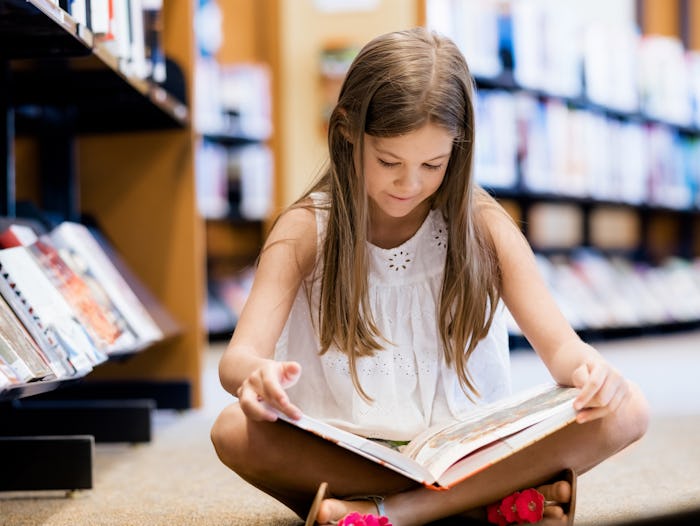Life

Here's How To Know If Your Child Is Ready To Read Chapter Books
Unless you're well-versed in Early Childhood Education, it can be hard as a parent to really know what your child is "supposed" to be doing at what age — like, reading. Of course every child is different, and though we shouldn't compare their growth or development to any other child's, it's nice to have a little marker in mind when it comes to milestones. If you're the parent of an emerging reader, you might have some questions. Like, what's "typical" when it comes to reading ages? And what age should kids read chapter books?
According to Judy Packhem, M. Ed., Certified Dyslexia Therapist (CDP), Certified Orton-Gillingham Specialist (C/AOGPE), a certified reading specialist and consultant, there is not a definitive answer as to when our child should be reading chapter books. "This depends greatly on the skill level of the reader and the reading level of the chapter book," Packhem tells Romper. "There are some wonderful beginning chapter books appropriate for second graders (around age 7), and proficient readers, by third grade (around age 8), are usually reading chapter books," she says.
Instead of thinking what age a child should be reading chapter books, Pachkem notes, it is more important to find the right match of book to the reader: "A good match holds a child’s interest and can be read with 95 percent or higher accuracy."
When considering books for your child as they learn to read, you’ll want your books at a “just right” level, meaning ones that are not too challenging. Packhem shares the 5-Finger Rule, a helpful measure of whether or not the book is the right level for your little reader. "Open to a full page of text and have them start reading," she says. "Every time they get to a word that they don’t know right away, hold up one finger. If you get to five fingers before the end of the page, the book is too challenging and will be frustrating to for the child to read." If the child spends too much of his brain energy on figuring out the words, he won't be able to focus on comprehension, and that's the main goal of reading, she says.
Of course, the books you are surrounding your child with should vary greatly, from simple ones they can read themselves easily — "Reading easy books is a wonderful way to improve reading fluency and confidence," notes Packhem — to more complicated ones that you read with your child. The most important thing to provide your child with is a rich reading environment and set the foundation for a love for reading and books.
"A big part of reading is wanting to read," Ais Her, Director of Schools at Fountainhead Montessori School in Dublin, California, tells Romper. "If parents make reading a chore, children become reluctant to take part," she says. Delivery matters, she notes. Avoiding messages like, "you have to read after you brush your teeth," and instead help your child consider reading a privilege. "You get to read after you brush your teeth!"
And, when wanting to instill positive reading habits in your kids, consider your own behavior, says Gwen Mak, M. Ed., professional development coordinator at Tales2go and former Montessori teacher/administrator. "They will remember what you intend to teach them, as well as what you don't intend to teach them, but may expose them to inadvertently," Mak notes. It's important for parents to evaluate their own actions and to be aware of the behaviors they model to their children. "Kids who observe their parents reading are more likely to want to engage in the same behavior," she says.
Make reading a family pastime, and consider the levels your kids are reading a little less than the love they are building for it. Children develop and learn at different paces, and though there are certain minimal standards, there is no "right" level for all children. If your kiddo is into books and reading, that's pretty much a win by all standards.
Check out Romper's new video series, Bearing The Motherload, where disagreeing parents from different sides of an issue sit down with a mediator and talk about how to support (and not judge) each other’s parenting perspectives. New episodes air Mondays on Facebook.